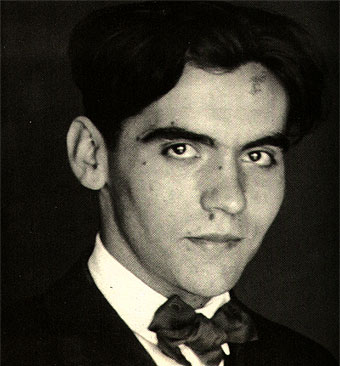Spain begins opening poet Lorca's suspected mass grave
 Granada, Spain - More than 70 years after one of Spain's greatest poets, Federico Garcia Lorca, was shot dead at the start of the country's 1936-39 civil war, a team of experts Thursday began opening mass graves, one of which is believed to contain the poet's remains.
Granada, Spain - More than 70 years after one of Spain's greatest poets, Federico Garcia Lorca, was shot dead at the start of the country's 1936-39 civil war, a team of experts Thursday began opening mass graves, one of which is believed to contain the poet's remains.
The team led by archaeologists was cleaning, measuring and placing signs on the site in Alfacar near the southern city of Granada, sources in the Andalucian regional government told the German Press Agency dpa.
The opening of a total of six suspected mass graves was expected to last at least two months.
It was not, however, clear whether the exhumation would clarify the circumstances of Lorca's death, as his descendants oppose it and may not want to make the findings public.
The author of Gypsy Ballads was arrested in the house of a poet friend shortly after right-wing General Francisco Franco had staged an uprising against the leftist Republican government.
Lorca is believed to have been shot dead with teacher Dioscoro Galindo and bullfighting assistants Francisco Galadi and Joaquin Arcollas.
Two other people, tax inspector Fermin Roldan and restaurant owner Miguel Cobo, may lie in the same grave.
The executioners loyal to Franco saw the 38-year-old poet as a leftist because his work was sympathetic to the downtrodden. They also targeted him as a homosexual.
Galadi's nephew Antonio Galadi said Thursday he hoped for the remains to be located and identified "as soon as possible."
If that could not be done, the family wanted "this chapter to be closed in the most dignified possible way," Antonio Galadi said in Seville, explaining that the Galadis did not want the exhumation to become a "spectacle."
The Spanish Civil War killed some half a million people and ended with the victory of Franco, whose dictatorship lasted until his death in 1975.
The Franco regime paid tribute to its own dead, but an estimated 120,000 alleged leftists killed during and after the war still lie in mass graves around Spain.
The opening of the Alfacar graves was expected to give a new push to exhumations which have already resulted in the digging up of the remains of some 4,000 people.
They have been carried out mainly by private associations, which have been receiving official assistance, especially after Prime Minister Jose Luis Rodriguez Zapatero's Socialist government passed a controversial 2007 law seeking to rehabilitate Franco's victims.
The opening of the Alfacar graves follows a six-year judicial and administrative battle, with courts disagreeing over which one of them was responsible for the Lorca case.
The Andalucian regional government finally authorized the opening of the graves at the request of the Galadi, Roldan and Cobo families.
The Lorcas oppose the operation, arguing that giving the poet a new burial would single him out from among anonymous war victims.
Lorca experts such as historian Ian Gibson, however, say the exhumation is necessary in order to establish the definitive truth about the poet's fate.
Many people also find it shocking that a universally acclaimed poet, who is the main symbol of Franco's repression, should have been left in an unmarked mass grave.
The Lorca family has agreed to provide DNA samples for identifying his bones, but may not allow the findings to be made public. However, many observers believe it will be difficult to keep them secret.
The exhumation has already aroused widespread media attention, prompting regional authorities to cover the 200-square-metre site with a tent-like structure and to put it under guard.
The experts working at the site are not even allowed to use mobile phones while digging at the soil with picks and spades. (dpa)